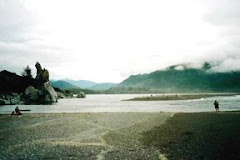On March 24th in Eureka the North Coast Water Quality Control Board – the body charged with enforcing the Clean Water Act in California portions of the Klamath River Basin - unanimously approved a clean-up plan for the Klamath River. While most environmental and fishing interests praised the plan, long-time Klamath River Activist Felice Pace alleged that the decision had been tainted by interference from the office of California Governor Arnold Schwarzenegger.
Last week Pace told the Water Board that the Governor’s office ordered the Board and its staff to change provisions applying to PacifiCorp – the Berkshire-Hathaway-Warren Buffet subsidiary which owns the five main stem Klamath River dams. According to his hearing testimony, the Water Board dutifully changed language in the clean-up plan in a manner that exempts PacifiCorp from Clean Water Act compliance.
PacifiCorp's Iron Gate Dam - the lowest of five mainstem Klamath River dams owned and operated by the company
This means that PacifiCorp will not be required to directly clean-up Microcystin – a toxic, blue-green algae by-product - which is proliferating in the company’s Klamath Reservoirs. Microcystin from those reservoirs has rendering Klamath River water dangerous for people and animals which come in contact with it all the way from the dams to the Pacific Ocean . Microcystin is a powerful liver toxin.
Instead, PacifiCorp will pay farmers and ranchers above the dams to reduce the nutrient pollution they discharge. This in turn is supposed to improve the quality of the water PacifiCorp receives in its reservoirs and likewise the quality of the water discharged from the dams. The whole scheme has not been tried before or modeled and it is unknown whether or not it will be effective in reducing pollution from the dams.
Toxic Algae bloom - Iron Gate Reservoir
(photo by Thomas Dunklin)
What is known is that, if the North Coast Water Board decision stands, PacifiCorp will have escaped from the obligation for discharges from its reservoirs to meet Klamath River water quality standards. Those standards were established to protect Public and Tribal Trust Resources – including salmon and recreation. They include not only a prohibition on the release of Microcystin but also temperature and dissolved oxygen standards which the PacifiCorp dams do not meet.



